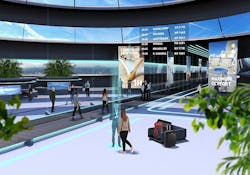High-tech, queue-free airports are only 25 years away
Technology is already being developed and trialed that could see an end to the constant queueing at airports, by using molecular body scanners at security and biometric tickets at check-in.
Airport parking operator and retailer Airport Parking and Hotels (APH) in England has created a computerized model of how an international airport could realistically look within 25 years. The project comes from extensive research into the different technologies that are being developed to improve passengers’ experiences, and how they are expected to change airports by 2040.
Among the airport experiences primed for an update is check-in -- a major source of queues and frustration for travelers -- which will become an automated doddle thanks to biometric technology.
Each passenger will be scanned for biometric identifiers unique to them, such as iris patterns, facial features, and even fingerprints. It will enable passengers to get a biometric token that will serve as their passport, boarding pass, and ID for the journey, without having to keep hold of their separate documents.
The system is already proving to be a faster alternative to manual passport checking, following tests at Heathrow Airport in London and Amsterdam Airport Schiphol.
Similarly, with security being such a major concern in air travel, checkpoints are currently a major bottleneck at airports, with every bag of hand luggage needing to be opened and passengers required to walk through metal detectors. In the future, laser molecular body scanners, originally designed for medical use, will be used to screen for banned materials or liquids hidden in clothing or luggage. Effective from several meters away, the scanners will enable people to simply walk past a scanner, rather than wait in another queue.
On arrival, the seemingly endless wait at the baggage carousel will also be a thing of the past, as chips embedded in either the cases themselves or the tags will not only track each item’s destination and location, but will send smartphone notifications when they’re ready to be collected. This same system will enable luggage to be distributed around the airport, as passengers will drop their bags at one of the many drop-off points at the car park, train station, or even coffee shops, which are then connected to high-speed conveyor belts.
Less waiting means that passengers will instead be able to spend their time browsing the airport’s touchscreen shopping walls, or asking for travel information from one of the many virtual assistants. Using a more advanced version of the technology in today’s chatbots, these will provide customer service and advice in a variety of languages.
Technology will also have a much greater role in airport management and safety. Automated control towers, although closely overseen by people, are expected to take over at least some aspects of air traffic control, to minimize the risk of human error.
“Technology in aviation is advancing all the time, but this shows how certain aspects of the airport experience are due to get a much-needed overhaul in the next few years,” says Beverley Barden, head of marketing at APH. “Through this research and the models we have created, we are able to see what airports could realistically be like in the near future, and it’s going to be very exciting to watch them take shape. It’s innovation like this, especially in the check-in, security, and baggage bottlenecks, that will make the airport a much more pleasant experience.”
For more information about the future of airports, visit http://www.aph.com/community/aph-airport-of-the-future/.
APH (Airport Parking and Hotels) is an award-winning airport parking operator and retailer. This year APH celebrated its 36th year as a retailer and operator of pre-booked airport parking and travel extras. APH offers parking at all major U.K. airports as well as airport hotels and airport lounges. APH is also a carbon-balanced company and has, through support of the World Land Trust, helped purchase more than 1,000 acres of endangered rainforest.
Search the Aerospace & Defense Buyer's Guide
You might also like:
Subscribe today to receive all the latest aerospace technology and engineering news, delivered directly to your e-mail inbox twice a week (Tuesdays and Thursdays). Sign upfor your free subscription to the Intelligent Inbox e-newsletter at http://www.intelligent-aerospace.com/subscribe.html.
Connect with Intelligent Aerospace on social media: Twitter (@IntelligentAero), LinkedIn,Google+, and Instagram.
Intelligent Aerospace
Global Aerospace Technology NetworkIntelligent Aerospace, the global aerospace technology network, reports on the latest tools, technologies, and trends of vital importance to aerospace professionals involved in air traffic control, airport operations, satellites and space, and commercial and military avionics on fixed-wing, rotor-wing, and unmanned aircraft throughout the world.






